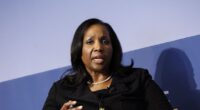More people than ever before have declared themselves as not heterosexual, but, sadly, the trans community still faces adversity
The 2021 census results for the first time paint LGBTQ people on the national canvas. Just over 3% of the population of English and Welsh citizens have declared themselves not to be heterosexual, a similar proportion to that estimated by the Office for National Statistics, which suggests a doubling in number since 2014. That isn’t, of course, because homophobic fantasies have been realised – that, if permissible, homosexuality will spread like an infection – but because increased social acceptance has allowed LGBTQ people to realise their authentic selves.
The fluidity of sexuality is observable in the results: there are nearly as many bisexual and pansexual people as there are gay or lesbian. This justifies the complaints of campaigners about a phenomenon called “bi-erasure”: where bisexual people are often left out of conversations around queerness. Bi people face prejudice not just from straight citizens, but from gay and lesbian people, too: bi men are often treated as gay but in denial; bi women face widespread sexual objectification; and all are portrayed as sexually rapacious or tourists who don’t belong anywhere.
Owen Jones is a Guardian columnist
Do you have an opinion on the issues raised in this article? If you would like to submit a response of up to 300 words by email to be considered for publication in our letters section, please click here.




